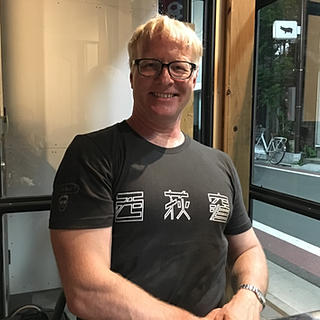A Business Model for Better Living
- James Farrer
- Jan 4, 2025
- 17 min read

With a reputation for quirky independent businesses, Nishiogi (Nishi-Ogikubo) has become a magnet for wannabe gastronomic entrepreneurs. But despite its reputation for fostering independent eateries, finding customers interested in a unique product is only the final hurdle. Before that, a location must be secured, a menu created, and key decisions made about pricing and marketing. It helps to have a gentle guiding hand to avoid being slapped by the harsh “invisible hand” of market forces. Workshare and space-sharing arrangements are increasingly seen as a way to enter the market gently, with more support and less risk. For some ambitious people, they are a step towards independence. For others, they are a long-term arrangement that allows them to pursue their dreams while dealing flexibly with other obligations. For the managers of these rental spaces, organizing a rotating set of subtenants can be a way of utilizing a space throughout the day by multiple vendors with varied clientele, creating a new income stream for a space that might only have intermittent foot traffic. Shared spaces thus distribute business risks, but the best ones also share knowledge, experience, and networks, thus creating both economic and social values for the sub-leasers. Usually oriented as much towards building community as turning profit, they are a hybrid of entrepreneurship and social business models.
Starting out at Teinei-ni
With a long and evocative name that translates roughly as “All sorts things for life, with care Teinei-ni," a small café space located 550 meters from Nishiogi Station down the lively historic shopping of Shinmei-Dori. It was opened by the owner, Tomokazu Fukuda, who had been working as an acupuncturist, to start his own independent practice. It developed into a multipurpose space hosting businesses with four broad focuses: “eating,” “living,” “relaxing,” and “learning.”
“It started in 2013, so it’s been 11 years,” Fukuda said. “Originally, I was just an ordinary office worker. I quit that and went to acupuncture school because I wanted to study Eastern medicine. Eastern medicine is famous for acupuncture and herbal medicine, but the most fundamental thing is to ‘first do what you can do yourself.’ For example, things like diet, exercise, and the state of mind. That’s the most basic aspect.
Fukuda saw Eastern medicine as an alternative career path to corporate work. “After graduating, I worked as a regular office worker,” he said, “doing sales for an electronic parts manufacturer. But I started thinking that doing this for my whole life wasn’t quite right. I wanted to go in a deeper direction, so I thought about various things. For example, becoming a monk, or perhaps a Western doctor, or studying psychology or philosophy. In fact, before quitting my job, I took a week off and went to a temple in Kyoto to experience monastic training. There was a place where people, including foreigners, could do a training experience. While I was there, I practiced zazen (sitting meditation), did some cleaning, and ate meals. It was a kind of accommodation. But I felt that this wasn’t quite right for me. Monks are somewhat isolated, living in their own world. I wanted to interact with more regular people. So, after thinking about it, I found the Eastern approach to medicine, where it emphasizes the connection between humans and nature, and the idea of seeing the body as a whole, to be very interesting. That’s when I decided I wanted to study Eastern medicine. And in Japan, the best way to do that is by attending acupuncture school. So, that’s why I went to acupuncture school.

His own experience of corporate burn-out motivated this turn to alternative medicine, he explained. “I was pretty busy, working overtime until midnight or 1 a.m.,” he said. “At the time, since everyone around me, including my seniors, was doing the same, I thought it was normal. But looking back now, I realize it probably wasn’t good. Around the year 2000, during the IT bubble, the electronic parts manufacturer I worked for was quite busy.
“Before I started my own practice, I worked in Nagano at a health-themed accommodation facility (Hotaka Yōjōen in Azumino, Nagano). It wasn’t like a normal inn where alcohol is served and meals come out in large portions. The theme there was about taking responsibility for your own health, so meals were macrobiotic, and there were yoga classes. They also offered therapies like aromatherapy, which were available as options.
“The concept of Hotaka Yōjōen really resonated with me. Actually, the owner there is also an acupuncturist. Since we shared similar views, I talked with him, and after that conversation, I asked if I could work there once I graduated. So, after graduating from acupuncture school, I worked there for six years. I was in my mid-30s at the time, and I started thinking about becoming independent. The people who come to places like that are often exhausted… it’s more of a place for rest. Some of them have illnesses like cancer or atopic dermatitis.
“I thought it would be nice to have a place that’s a little closer to everyday life, where people could take a break. If I were to do it, I felt that Nagano would be a great place, but since it’s in the mountains, it’s hard to get to. It’s expensive, and you have to take time off work to go there. I thought it would be great to have a place where people could unwind after work, before going home, and recover from the fatigue of the day. That’s why I decided to start this place.
“These days, people are often tired, right? There are a lot of people who are exhausted, so I wanted to create a place where they could rest both mentally and physically. That’s how I started this place.
“Nishiogi is my hometown. I was born and raised here, so I decided to come back. Plus, a lot of people in Nishiogi like this kind of thing—natural food and so on. There’s also a ‘Hobbit Village,’ so I thought, ‘Let’s do it here!’ and that’s how I started.
A Multifaceted Business Model
Currently, Teinei-ni runs four businesses: Eating (Cafe), Living (Real Estate Agency), Relaxing (Therapy), and Learning (Workshops), but initially, it was focused on just "Relaxing" and "Eating." The overall philosophy of the shop prioritizes two key concepts: "security (anshin) and safety (anzen)" and "a meal that allows you to relax and feel at ease."
“At the beginning,” he said, “I teamed up with a female staff member who was really good at cooking. She would prepare the meals, and I would handle the front of the house, including the accounting and cleaning. Plus, there’s a treatment room in the back where I did acupuncture, and she was skilled in Thai massage and reflexology, so we offered those treatments as well.
“She was from Nagoya, which is famous for its morning breakfast culture, and she wanted to serve breakfast. Also, as I mentioned earlier, I wanted to create a space where people could relax after work, so we also served dinner on weekdays. So, we had breakfast and dinner. “Additionally, we used a shared approach, where, when we weren’t running the café ourselves, other businesses would come in. During weekdays, a coffee shop operated, and on weekends, different cafés would take turns running the place. That’s how we started.”

This first vendor married and retired about five or six years ago. After that, she became independent and is now running a business in Kochi Prefecture. Currently, the food and beverage operations are all managed by young women, each providing food based on their own concept. In the Fall of 2024, there were four restaurant businesses sharing the space of Teineini:
• Sunday and Monday: Hulot Café offers Western dishes, including pasta with a focus on sauces, as well as desserts. Previously, they operated in the shared space of +Café (Tasu Café) in Nishiogikubo.
• Tuesday: Picnic uses ingredients that are kind to the body and offers snacks like muffins.
• Thursday and Friday: Onshin has the longest connection with the shared space of Teineini. They serve heartwarming set meals and receive many takeout orders from regular local customers.
• Saturday: Goyururi has a fanbase among younger people, and their one-plate meals are especially popular. The owner not only runs the restaurant but also teaches cooking online and face-to-face.
In the end, participating in the shared business model is a choice made by vendors, Fukuda explained. “It depends on the person,” he said, “but one type is those who want to open their own shop. Another is people who want to pursue their hobbies or do what they’ve always wanted to do. So, it’s mostly women in our case, since everyone here is a woman. Many of them have husbands who work, so they can manage their living expenses. It’s more of a "plus alpha" situation. Some people want to make their hobbies a reality. For example, the young woman running Goyururi on Saturdays quit her job and, although she's not a professional gastronomic researcher, she does a variety of things. She teaches people how to cook meals suited to them online, or she goes to their homes and prepares a week’s worth of meals for them. She does these things as part of her overall activities, and she runs her shop here once a week as part of that.”
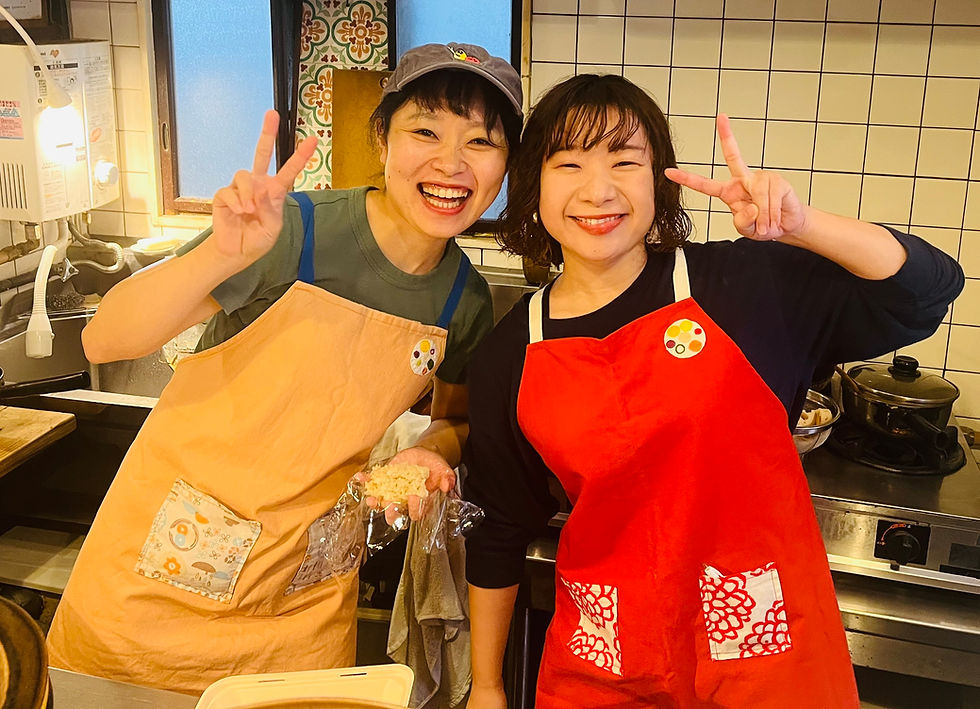
Financially, the system is one in which all the vendors pay him a fixed rate each month, Fukuda explained. “For those who rent the space, the cost is fixed depending on the day of the week, such as a specific amount per day, with differences between weekdays and weekends. It's not a percentage of sales, but a fixed rate. I rent the entire space from the landlord, and I receive payment from everyone, which covers the rent and utility costs. Additionally, I also do therapy and real estate work. That’s how I generate my income.”

So including its food businesses, Teinei-ni operates four different types of businesses. At first glance, it might seem like these are completely separate ventures, but when you visit the shop space, you can experience all four elements synergistically. “I think it’s a bit unique to be doing so many different things,” Fukuda explained “For example, if someone comes in to eat, they might see property listings displayed, and if something catches their interest, I’ll come out from the back and talk to them about it. Or, someone who just finished their treatment might want to have a tea, so they’ll sit down and enjoy a drink.”
During the interview, Fukuda showed us the treatment room at the back of the shop. Opening the door at the back of the store reveals another wood-paneled space. This is where acupuncture treatments and real estate work take place. The building itself is 60 years old, and it was originally used as a residence. There also are three small apartments on the second floor.
Fukuda splits his time between Teinei-ni and his responsibilities helping out at the Nishiogi no Koto Café (aka Koto Café), a newer and much larger cafe operated in the first-floor space of the Koto Building down the street. Like Teinei-ni, Koto Café hosts a variety of vendors as well as many other community activities. Fukuda is one of the participants in the Koto Building project.
We asked about the difference between the business models at Koto Café and that at Teinei-ni
“Well, the concept for Koto Café was created partly by me, so I think it’s quite similar. In the case of Koto Café, I made it possible for people to rent the space even for just one day. The reason for that is that at Teineini if I don’t have fixed bookings like once or twice a week, I can’t manage it well. (At Koto Café), there are even people who rent it just once every six months. By doing this, we’ve been able to expand the possibilities.
“Running a shop is quite challenging. It costs money, and you have to quit your job. But when people feel like being just a salaryman isn’t quite right for them, or when stay-at-home moms are looking for something to do, there’s no real opportunity for them in between.
“Teinei-ni is relatively more of a commitment since running a shop once or twice a week is closer to actually managing a business. But I also want to give more people the chance to do what they want. So, for Koto Café, we made it more flexible. At Koto Café, there are people who run cafes, some do fortune-telling, and recently, someone even came to run a marriage consultation service. It’s interesting because there’s a wide variety of people who come.
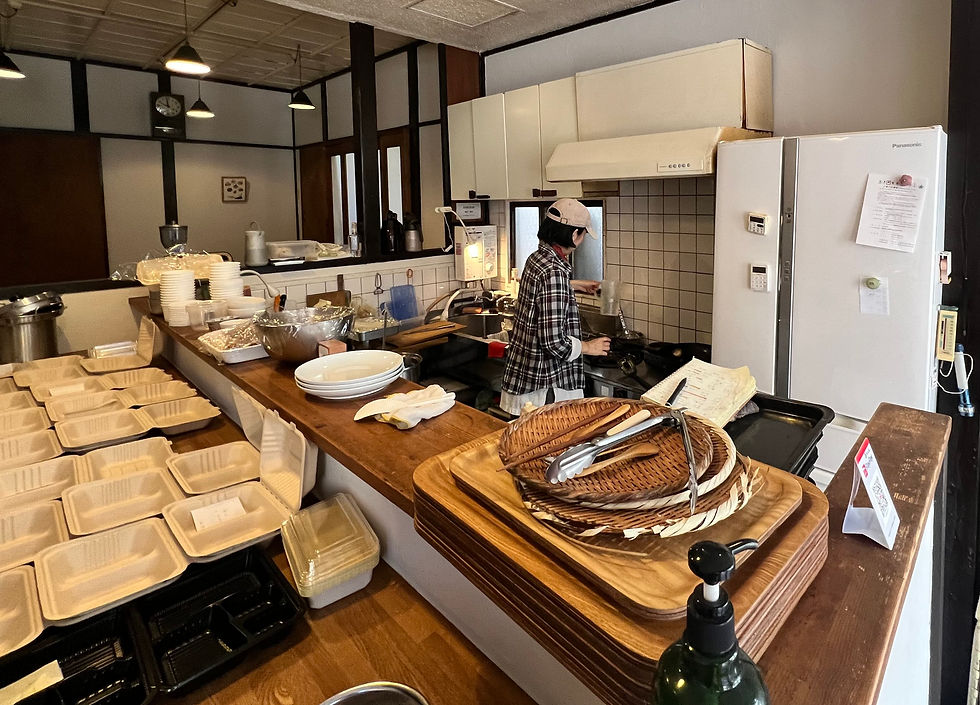
A Home-Like Atmosphere
The goal is to provide a place where people can take a little break and feel like they’ve come home when they visit. The interior design of Teinei-ni. plays a crucial role in creating that warm, welcoming atmosphere, with Fukuda’s attention to detail.
The interior is designed to feel a bit like a home rather than a typical store, Fukuda explained. “The theme I aimed for was something like ‘my childhood home’ or ‘grandmother's house.’ The space was originally just a regular shopfloor, but I asked a carpenter to help transform it, adding tatami mats and creating a kotatsu (the low-rise Japanese table with an electric brazier underneath). Also, counters are usually for people wearing shoes, but I wanted people to take off their shoes when they come in. So, I deliberately set it up so they would take off their shoes. I thought that having people remove their shoes would make the space feel more relaxed. Even though it’s a counter, I made it so that people would take off their shoes and change into slippers.
Fukuda's favorite spot in the café space is the kotatsu, with its cozy quilted skirts that cover the legs of the guests seated on the tatami flooring. “The best part is when people sit down and enjoy a meal together here. Recently, some kids have never even seen a kotatsu. Many families didn’t have one, so it’s often referred to as something from ‘grandmother’s house’ But a kotatsu is really relaxing, isn’t it? The tatami seating seems to be especially welcoming for families with young children. When you have small kids, it’s hard to get them to sit still in a chair, right? So, they often end up rolling around here (laughs). People often say it’s the first time they’ve ever seen a kotatsu (laughs).”
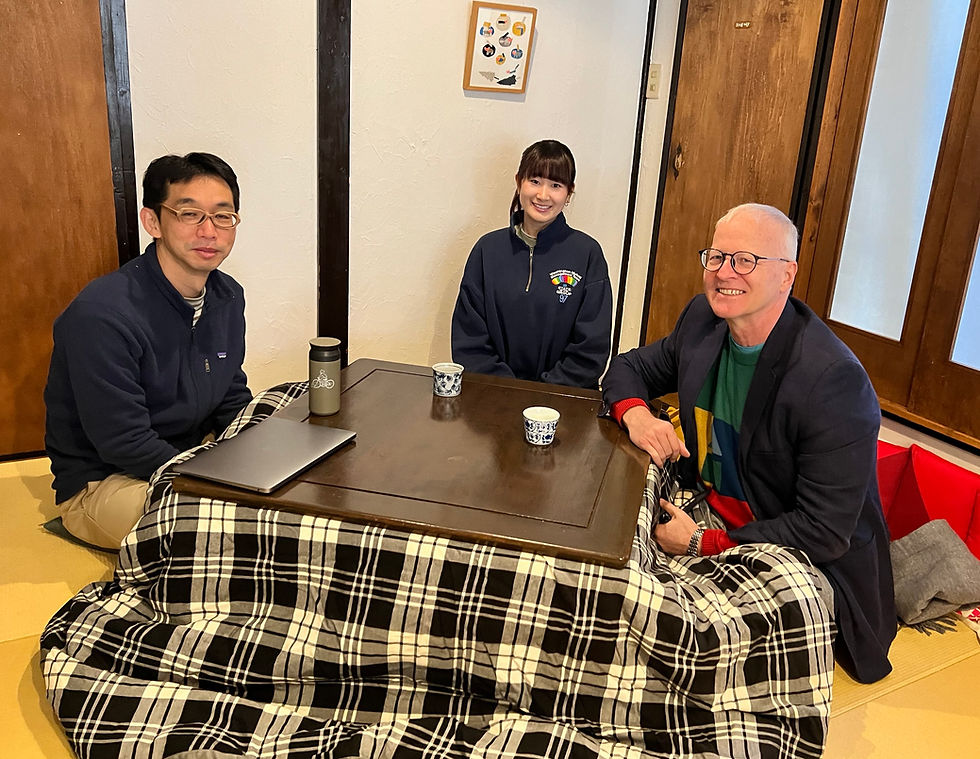
The tatami-covered dining room and the kitchen with its facing counter are separated only by a low counter to allow for conversations to flow freely. “Normally, counters have all sorts of things hanging from them, but I’ve deliberately removed those here,” Fukuda explained. “Usually, people try to hide things like that, right? They don’t want to be seen (laughs). I think most chefs would hate it, but I went ahead and made it that way... Also, when you sit at the counter, the line of sight is the same as the person cooking. So, people at the counter can chat with the chefs or whoever’s cooking. It’s a place where even if you come alone, you can talk to others, including the staff.”
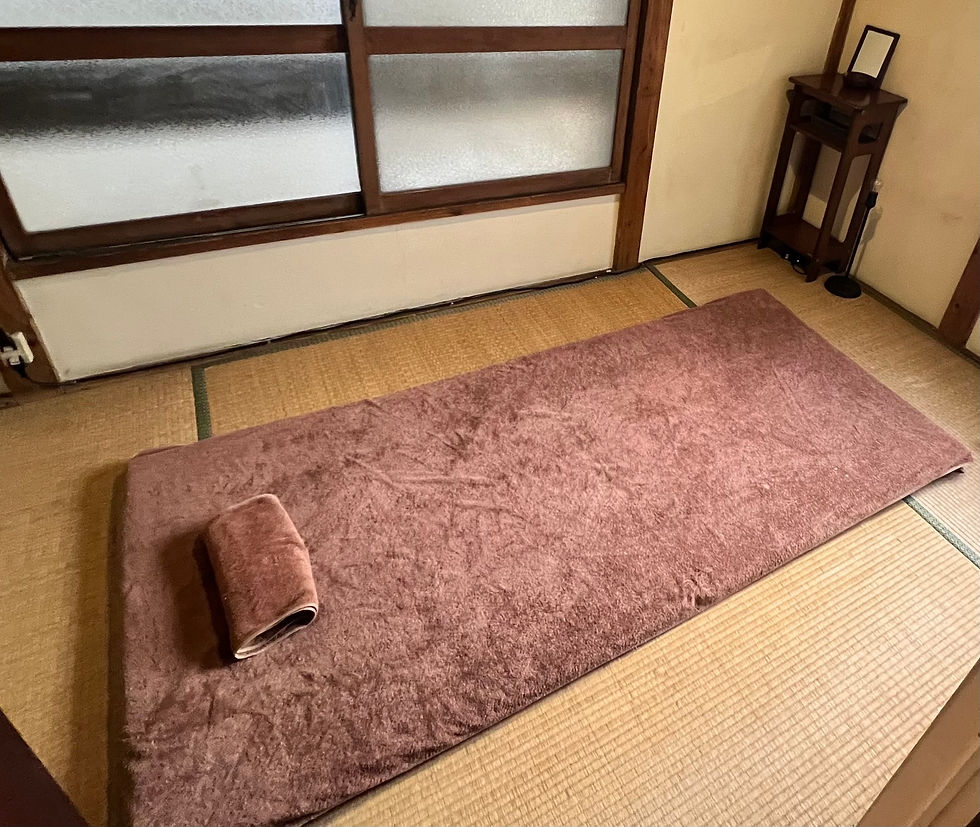
The Real Estate Business
Initially, Teinei-ni focused on two main services: “eating” and “relaxing.” However, over time, it expanded into the real estate business, specifically in the Nishiogikubo area, due to the needs of the community and personal experiences. Fukuda, being from Nishiogi, was often perceived as someone knowledgeable about the area. People began to ask him about the neighborhood, and many were interested in living there.
“At first, it was a therapy room and a dining space, and the name was ‘Food and Therapy Teinei-ni.’ After running it for about two or three years, I started to get more questions. Being from Nishiogi and running a business here, people started thinking I must know a lot about the area. And, to be honest, I do know more than the average person. Nishiogi is actually a place a lot of people want to live in—though not as much as Kichijoji. So, I often get asked to show people around the town, or people will say things like, ‘Could you tell me a bit about Nishiogi?’ or ‘Can you give me a little tour of the area?’”
In response to the growing interest in the Nishiogi area, Fukuda started a monthly “Nikurasu Tour.” This tour is designed for people interested in living in Nishiogi. Fukuda personally guides participants around the neighborhood on foot, sharing insights about the area while also visiting various properties. Typically, when searching for a property, people tour with a real estate agent in a car, which can make it difficult to get a feel for the neighborhood. By walking through the area and learning about the land while viewing properties, participants are better able to imagine what it would be like to live there. However, in order to conduct real estate transactions, a real estate license is required, and at the time, Fukuda did not have this qualification. To be able to guide potential buyers through the process and finalize transactions, he obtained the necessary certification. Today, he operates as “Nishiogikubo Teineini Real Estate.” Recently, for example, he has arranged a rental space for a new cafe in a very convenient location, only a few minutes from Teinei-ni.
The biggest obstacle for people wanting to open up new shops or eateries is rising rent. Most people come looking for something in the range of 100,000 to 150,000 yen a month. But there is almost nothing in that range in Nishiogi, he said.
Fukuda explains that many of the people who come to him are individuals looking for properties, but it’s difficult to find options that fit their desired rent. The rent can vary depending on factors like the distance from the station, but generally, properties for ¥200,000 or less are hard to come by. For rents around ¥150,000, properties tend to be farther from the station, on the second floor, or down quieter side streets. It’s challenging. In the past, there were properties available for ¥100,000 or ¥150,000. When Fukuda was looking for properties, rents were even lower.
Starting a Business in Nishiogi
At Teinei-ni, several of the restaurants that had used the shared space later went on to open their own independent businesses. Before the pandemic, Fukuda offered consulting services for people who wanted to start their own small businesses. This was part of the “Learning” aspect of the four main areas of “Teinei-ni.”
Even before he started in real estate, Fukuda had been running a “Small Business Start-up Seminar.” While this has not been held since the pandemic, the seminar involved gathering a few people who wanted to start businesses. Fukuda would talk to them, and then they would share their plans, discussing things like unclear concepts or the need for better financial planning. One of the women from the “Onshin” restaurant, who was at the location during the interview, was a graduate of this seminar. She had run a shop in Nishiogi before, but due to the pandemic, she decided to scale down and joined Fukuda's space.
There is no one secret to a successful business, but we discussed several factors that influence the success of businesses in Nishiogi. “First of all,” Fukuda said, “there are many people who want to try running a café. However, when it comes to the business side of things, it seems there are challenges. Coffee is usually about 500 to 600 yen, right? And when you go to a bar, you’ll order several drinks, but with coffee, even if you drink two cups, you’re not likely to drink three or four. The sweets, like cakes, are also 500 yen or 1000 yen. But at a bar, if you stay for two hours, you could end up spending 4000 or 5000 yen. The price per person is totally different. Right now, Nishiogikubo has a lot of bars, doesn't it?
“I want to support people who want to run a café, but I also tell them it’s difficult. When you talk about coffee and cake—right now, it's about 1200 yen for a set—and then you calculate how many people you need to serve to reach a certain sales target, it becomes clear that it’s quite tough.
The most important factor for any type of business is capturing regular customers, Fukuda said. “In the end, Nishiogi has a lot of local residents, so I think the key is to really value regular customers. It’s about getting them to come back repeatedly. Also, the difference from chain stores is that at an independent shop, people come because they want to meet the person who owns or runs it. They come because that person is the one making the food or drinks. It's that personal connection that draws people in.”

In general, he said, one has to consider the customer base, which in Nishiogi tends to be female. Also, one should also consider Nishiogi is an affluent area, and people demand quality in products. “I think people in Nishiogi generally have a bit more disposable income,” Fukuda explained. “So, if you're focusing on health, natural food, or things that have a bit of a conscious or ethical angle, it seems to resonate well with them. People who want to open businesses in Nishiogi tend to share that kind of mindset, too. For example, Palms (Palms Park Coffee) also uses organic ingredients, which aligns with that kind of focus on health and sustainability.
Understanding the customers you approach is important. However, Fukuda says that the most important thing for the shop itself to focus on is the concept. “The most important thing is definitely the concept,” he said. “It’s about what you want to do. If you don’t think about that, things will start to get blurred as you go along. Once you decide on the most important thing you want to focus on, I think you can keep changing the smaller details as you go. Most people already have a general idea. But I might help them clarify it a little more. After all, the concept is up to the person themselves, so I can’t decide that for them.”
Financial planning is of course essential. “People who want to open a shop often struggle with money matters, so I tend to help them with that. I tell them they need to think about their financial plans, like revenue and expenses. A lot of people are really eager and want to get started, but they don’t always think things through, so I try to slow them down and get them to consider it more seriously. (laughs)”
There are people who get startup support. “Personally, I think that once you take out a loan, it becomes hard to avoid doing things that are beyond your capabilities, which can make things difficult. If you can, it’s better to use your own savings. But, if you don’t have the money and need to save, that time might feel wasted. If you're going to work hard for five years to save, maybe it’s better to start right away and pay it back later. But if you have the money, it’s better not to borrow. Also, banks won’t lend you money unless you have some savings. They’ll judge that you can’t repay if you don’t have any savings. If you say you have no money at all, banks won’t trust you. If you want to borrow 5 million yen, you should have at least 2 or 3 million yen in savings... Also, if you're going to take out a loan, you'll need to calculate the repayment period. If you're starting a corporation, you'll definitely consider that as well.
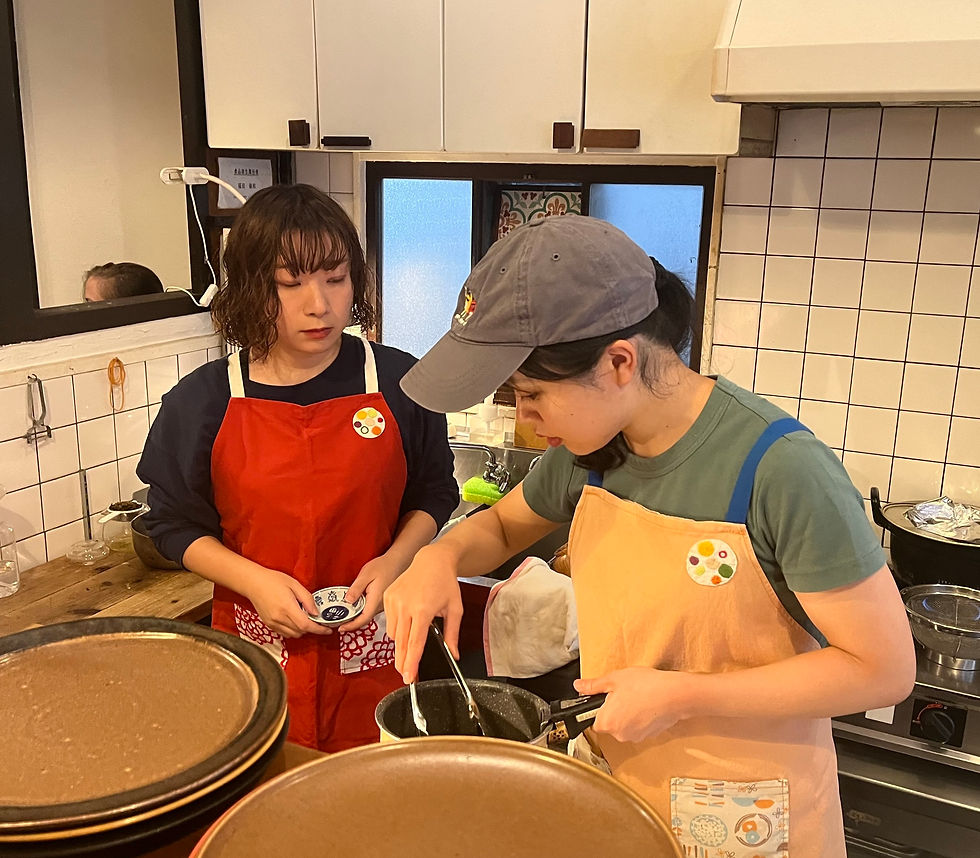
When starting a business, there are many financial considerations to keep in mind, aside from the significant barrier of rent. “The main cost is interior construction,” Fukuda said. “After all, running a restaurant requires a lot of money. It costs millions, even for a low-budget establishment. A coffee roasting machine, for example, can cost as much as a car. Generally, people borrow money for their startup costs.”
Fukuda also shared with us some rules of thumb for considering the breakdown in costs in running a food-and-beverage business. “In the case of a restaurant, the general breakdown is that food costs account for about 30 percent, rent is about 10 percent, which is typically equivalent to about three days’ worth of sales. The remaining 60 percent would cover expenses such as labor costs if you’re hiring staff, utility bills like water and electricity, and miscellaneous expenses. Additionally, for a sole proprietorship, the profit becomes your personal income, so that can also be considered part of your labor costs.”
Finally, we asked about the biggest reasons that some businesses fail in gastronomy in Nishiogi, and his answer reflected his holistic approach to life and business. “Actually,” Fukuda said, “I don't think there are many failures in Nishiogi, surprisingly. The shops that tend to close down are often due to health issues. Health problems are quite common. When you’re running a shop, if you’re unable to work, it's essentially over. That's why, even in the seminars, I always tell people to prioritize their health above all else. It’s a common pattern. When you ask around, it usually comes down to health problems. This isn’t just limited to Nishiogi, but especially in the restaurant business, the working hours are long. Plus, with a small business, you never really know what will happen tomorrow, so there’s a lot of psychological pressure as well. Of course, money is a factor too, but the pressure on health and mental stress can be significant. Everyone who runs their own business often talks about these kinds of worries. It’s hard to make a living, and that can be really tough.”
A Microcosm of Nishiogi Economics
Among the stations along the Chuo Line, Nishiogi has become known as a testing ground for new small service businesses, especially in gastronomy. Teinei-ni is a microcosm of these processes. We see how some people use the shared space to develop business ideas and products, while others decide to stay part of the sharing economy. We also see how small businesses in different sectors can also be synergetic, sharing spaces and sharing customers. Finally, we see how there is a fine line between entrepreneurship and social business. Many small businesses in Nishiogi are not designed to make a big profit. Rather they are intended to improve the lives of the owners and customers in more intangible ways. Nishiogi is also a hotbed of ideas for better living in the competitive market economy (James Farrer and Nagiko Shimooka Jan. 5, 2025).
(Interview by James Farrer and Nagiko Shimooka Nov. 3, 2024; transcription and translation by Nagiko Shimooka; text by James Farrer and Nagiko Shimooka; copyright James Farrer, all rights reserved)
